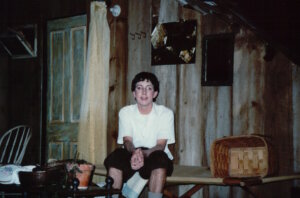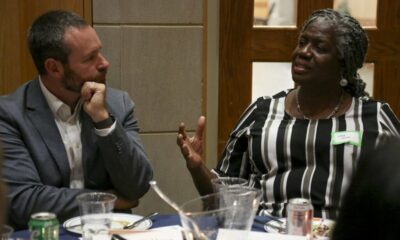Local News
New Christian Zionist Christian Friends of Israeli Communities director makes first visit to Winnipeg
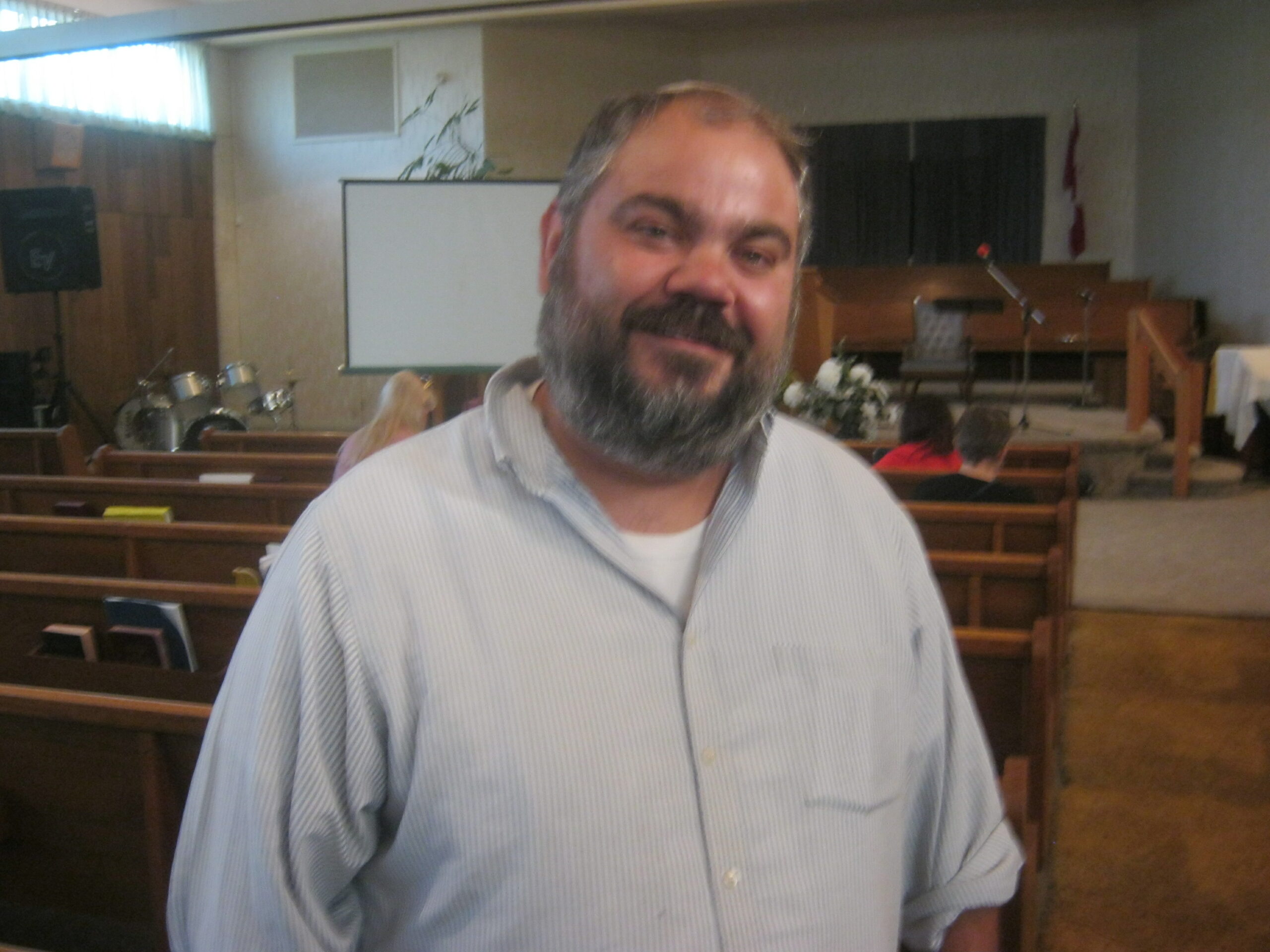
By MYRON LOVE Last October 7 began as a normal Shabbat for Shmuel Junger. As usual, the longtime resident of the community of Zufim (population about 2,500) in Samaria was at shul studying Talmud with his chevruta (study partner). It was only after they finished that they learned that all hell had been unleashed.
“Everyone was on their phones,” he recalled. “A daughter of friends was at the Nova Festival. She had texted her parents that she was in hiding. A week went by and there was no word from her. She was among the 1,300 who were murdered.”
Junger was in Winnipeg on Tuesday, July 23, in his role as the new Israel executive director of Christian Zionist Christian Friends of Israeli Communities (CFOIC) Heartland, an organization that connects supportive Christians with the Jewish communities in Judea and Samaria – the ancient Biblical heartland. He spoke at Christian Zionist Faith Temple, which is led by Pastor Rudy Fidel and his wife, Gina, both strong supporters of Israel.
“Israel is not the same country that it was before October 7,” Junger observed. “People are heartbroken. The trauma is almost of the same magnitude as that which is experienced by Holocaust survivors.”
It is ironic, he noted, that the attack happened in the south. Judea and Samaria, he pointed out, have long been considered to be the most dangerous areas to live in for Israelis – living cheek by jowl with Palestinians and having to be on constant alert for terrorist attacks.
So how was it that the attack was allowed to happen? “Hamas pulled the wool over our eyes,” Junger said. “They had been preparing for two years. No one realized who we are dealing with.”
He showed an interview with a Hamas spokesperson who stated that the Israeli weakness is that they love life whereas the Palestinians worship death.
And it is not only the large number of people murdered that has roiled Israel, Junger continued. “There are also the more than 300 Israeli soldiers who have fallen in battle, the 350,000 reserves who were called up – resulting in labour shortages, and the 250,000 Israelis who were evacuated from their homes in the north and have been internally displaced for months now because the constant Hezbollah missile fire makes it too dangerous for them to return.”
On the other hand, Junger spoke of the thousands of Israeli reservists who flocked back to Israel from all over the world immediately after the October 7 attack.
He also spoke of the individual heroes of that dreadful day who risked their lives to save others in danger – in particular Elhanan Kalmanson, a father of five from Hebron who, after learning of the attack, jumped into his truck with his brother Menachem, drove into the heart of the flames – Kibbutz Beeri – and managed to bring out more than 100 kibbutz members to safety before Elhanan was himself shot and killed.
Junger then showed a video of Hadas Lowenstein talking about her husband Elisha. a tank operator who fell in battle in Gaza in December. In a moving tribute to him, the mother of six painted a picture of a remarkable man, a Torah scholar who had translated the works of the late Rabbi Adin Steinsaltz, as well as a modern man who kept himself physically fit.
“He was the love of my life,” she said. “We were planning a wonderful life together. He died for Kiddush haShem. Our response has to be that we love life.”
Junger pointed out that, despite the challenges the country is facing, Israelis are a resilient people. He also noted that the Jewish people in the Land of Israel have had to deal with the threat of attack from their Arab neighbours for decades even before the State of Israel was established. He recounted the story of the Hebron pogrom of 1929 – and how his own family was affected.
(To remind readers, the pogrom was an attack on the ancient Jewish community is the Samarian town. Arabs murdered almost 70 Jews with the remaining 435 forced to leave.)
Among those affected, Junger noted, were his wife’s baba, Esther Slonim. She and her brother were the only two members of their family to survive that massacre.
“For centuries, our people had always dreamed of one day returning to the Holy Land,” he remarked. “Wherever we wandered, there was a deep-rooted longing in every Jewish soul that we would return.”
Israel is the realization of the Biblical prophecy of the ingathering of the Jewish people from exile. Junger noted that his own family – as well as his wife’s family – epitomize the Jewish journey in exile and return. His zaida relocated from Europe to Columbia where he became Rudolpho Rudy. Rudolpho at some point went to Palestine to find a bride to take back to Columbia, where Junger’s father was born.
His mother was born in Tunis and grew up in France.
His parents met in the United States and eventually made aliyah.
“I was born in Israel,” he said.
Shmuel Junger pointed out to his audience that he is among more than 500,000 Israelis who are now living in Jewish communities in Judea and Samaria (a.k.a. the “West Bank”) and reclaiming our Biblical heartland.
“We are doing God’s work,” he said. “The Torah is replete with references to places such as Shilo, Bethlehem, Shechem, Beth El and Hebron – all of which are in Judea and Samaria.
“The events of the Six-day war in June 1967 were a step forward in the realization of God’s prophecy.”
Still – living amidst often hostile Arab neighbours, the Jewish communities of Judea and Samaria have to be ever on the alert. To that end, one of the requests that Junger had of supporters of CFOIC was funding to purchase advanced security cameras for the Jewish communities in the region – cameras that can differentiate in the dark between potential human intruders and animals.
He is furthering asking CFOIC for funding to provide for children of fathers who have been killed or wounded in the fighting so that those children might enjoy a camping experience or other forms of respite.
At the conclusion of Junger’s presentation, Rudy Fidel indicated his congregation’s enthusiastic willingness to help. In just the past two months, these friends of Israel and the Jewish people, Fidel reported, have already contributed $10,000 to the Jewish Child and Family Service, $700 to the Jewish National Fund and $1,400 to Emunah Women – which supports education and social welfare in Israel.
Readers who may want to contribute to Christian Friends of Israeli Communities Heartland can go to cfoic.com.
Local News
Further to the Simkin Centre’s financial situation
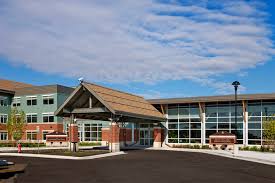
By BERNIE BELLAN A while back I published an article about the deficit situation at the Simkin Centre. (You can read it at “Simkin Centre deficit situation.“) I was prompted to write that particular article after reading a piece written by Free Press Faith writer John Longhurst in the August 5 issue of the Free Press about the dire situation personal care homes in Winnipeg are in when it comes to trying to provide their residents with decent food.
Yet, Longhurst made one very serious mistake in his article when he wrote that the “provincial government, through the Winnipeg Regional Health Authority, has not increased the amount of funding it provides for care-home residents in Manitoba since 2009.”
In fact, the WRHA has given annual increases to personal care homes, but its allocations are not broken down by categories, such as food or salaries. As a spokesperson for the WRHA explained to me in an email: “PCHs receive per diem global operating funding based on the number of licensed beds they operate. This funding model is designed to support the full range of operating costs associated with resident care, including staffing, food services, utilities, building operations, and other day-to-day expenses.”
Now, one can make a perfectly valid argument that the level of funding from the WRHA has not kept up with inflation, especially inflation in food costs, but the Simkin Centre is in an even more precarious position because of the skyrocketing cost of kosher food.
“In recent years,” according to an article on the internet, “the cost of kosher food has increased significantly, often outpacing general food inflation due to unique supply chain pressures and specialized production requirements.”
Yet, when I asked Laurie Cerqueti how much maintaining a kosher facility has cost the Simkin Centre, as I noted in my previous article about the deficit situation at Simkin, she responded: “approximately $300,000 of our deficit was due to food services. I do not have a specific number as far as how much of the deficit is a result of kosher food…So really this is not a kosher food issue as much is it is an inflation and funding issue.”
One reader, however, after having read my article about the deficit situation at Simkin, had this to say: “In John Longhurst’s article on Aug 5, 2025 in the Free Press, Laurie (Cerqueti) was quoted as saying that the annual kosher meal costs at Simkin were $6070 per resident. At Bethania nursing home in 2023, the non-kosher meal costs in 2023 were quoted as $4056 per resident per year. Even allowing for a 15% increase for inflation over 2 years, the non-kosher food costs there would be $4664.40 or 24% lower than Simkin’s annual current kosher food costs. If Simkin served non-kosher food to 150 of its 200 residents and kosher food to half of its Jewish residents who wish to keep kosher, by my calculation it would save approximately $200,000/year. If all of Simkin’s Jewish residents wished to keep kosher, the annual savings would be slightly less at $141,000.”
But – let’s be honest: Even though many Jewish nursing homes in the US have adopted exactly that model of food service – where kosher food is available to those residents who would want it, otherwise the food served would be nonkosher, it appears that keeping Simkin kosher – even though 45% of its residents aren’t even Jewish – is a “sacred cow” (pun intended.)
So, if Simkin must remain kosher – even though maintaining it as a kosher facility is only adding to its accumulated deficit situation – which currently stands at $779,426 as of March 31, 2025,I wondered whether there were some other ways Simkin could address its deficit while still remaining kosher.
In response to my asking her how Simkin proposes to deal with its deficit situation, Laurie Cerqueti wrote: “There are other homes in worse financial position than us. There are 2 homes I am aware of that are in the process of handing over the keys to the WRHA as they are no longer financially sustainable.”
I wondered though, whether the Simkin Centre Foundation, which is managed by the Jewish Foundation of Manitoba might not be able to help the Simkin Centre reduce its deficit. According to the Jewish Foundation’s 2024 annual report, The Saul and Claribel Simkin Centre Foundation, which is managed by the Jewish Foundation, had a total value of $11,017,635.
The Jewish Foundation did distribute $565,078 to the Simkin Centre in 2024, but even so, I wondered whether it might be able to distribute more.
According to John Diamond, CEO of the Jewish Foundation, however, the bylaws of the Foundation dictate that no more than 5% of the value of a particular fund be distributed in any one year. There is one distinguishing characteristic about the Saul and Claribel Simkin Centre Foundation, in that a portion of their fund is “encroachable.” The encroachable capital is not owned by JFM. It is held in trust by JFM but is beneficially owned by Simkin, similar to a “bank deposit”. While held by the JFM, these funds are included in the calculation of Simkin’s annual distribution.
I asked John Diamond whether any consideration had been given to increasing the distribution that the Jewish Foundation could make to the Simkin Centre above the 5% limit that would normally apply to a particular fund under the Foundation’s management.
Here is what John wrote in response: “The Simkin does have an encroachable fund. That means that at their request, they can encroach on the capital of that fund only (with restrictions). This encroachment is not an increased distribution; rather, it represents a return of capital that also negatively affects the endowment’s future distributions.
”It is strongly recommended that encroachable funds not be used for operating expenses. If you encroach and spend the capital, the organization will receive fewer distribution dollars in the next year and every year as the capital base erodes. Therefore, the intent of encroachable funds is for capital projects, not recurring expenses.”
I asked Laurie Cerqueti whether there might be some consideration given to asking for an “encroachment” into the capital within the Saul and Claribel Simkin Centre Foundation?
She responded: “We are not in a position where we are needing to dip into the encroachable part of our endowment fund. Both of our Boards (the Simkin Centre board and the Saul and Claribel Simkin Centre Foundation board) are aware of our financial situation and we are all working together to move forward in a sustainable way.”
At the same time though, I wondered where donations to the Simkin Centre end up? Do they all end up in the Simkin Centre Foundation, for instance, I asked Laurie Cerqueti on December 15.
Her response back then was: “All donations go through our Foundation.”
I was somewhat surprised to read that answer, so I asked a follow-up question for clarification: “Do all donations made to the Simkin Centre end up in the Simkin Centre Foundation at the Jewish Foundation?”
The response this time was: “No they do not.”
So, I asked: “So, how do you decide which donations end up at the Foundation? Is there a formula?”
Laurie’s response was: “We have a mechanism in place for this and it is an internal matter.”
Finally, I asked how then, the Simkin Centre was financing its accumulated deficit? Was it through a “line of credit with a bank?” I wondered.
To date, I have yet to receive a response to that question. I admit that I am puzzled that a personal care home which has a sizeable foundation supporting it would not want to dip into the capital of that foundation when it is facing a financial predicament. Yes, I can see wanting the value of the foundation to grow – but that’s for the future. I don’t know whether I’d call a $779,425 deficit a crisis; that’s for others to determine, but it seems pretty serious to me.
One area that I didn’t even touch upon in this article, though – and it’s something I’ve written about time and time again, is the quality of the food at the Simkin Centre.
To end this, I’ll refer to a quote Laurie Cerqueti gave to John Longhurst when he wrote his article about the problems personal care homes in Winnipeg are facing: “When it comes to her food budget, ‘we can’t keep making the same number of bricks with less straw.’ “
Local News
Exclusive: Security Enhancement Fund to be announced by Province in coming days
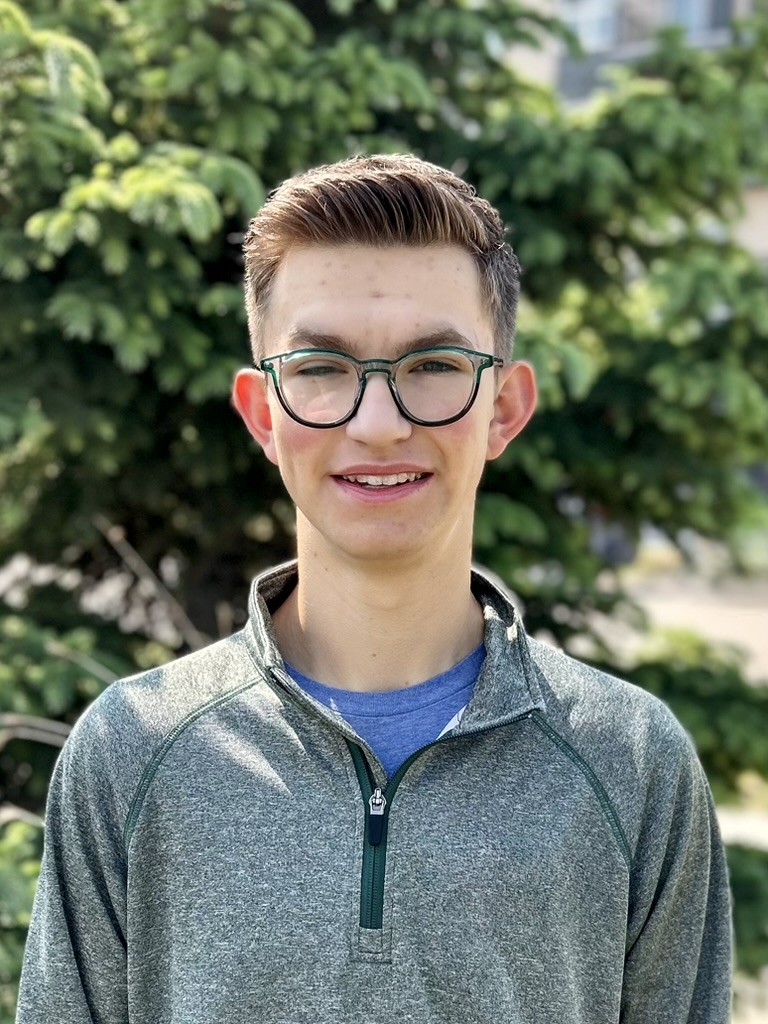
By NOAH STRAUSS The province is set to announce a new program called the Security Enhancement Fund, which
will provide funding to religious and faith groups to improve security at institutions such as
synagogues and mosques. In an exclusive interview, Minister of Justice Matt Wiebe outlined the
plan and detailed what the province has already done to help protect Jewish Manitobans.
“What we want to do is to be able to provide the community with the kind of tools that they need
to stay safe and to ensure that everyone in the community feels safe,” said Wiebe.
The fund will provide a missing link between government and religious communities, and
communities will now be able to make their own choices without money being a big restraint.
Essentially, the power will be in the hands of community leaders and not government officials.
The minister noted that the new partnerships will provide the province a better understanding of
the needs of every community. Rather than the province making the choices, they are
essentially giving a voice to each community. The grants, totalling $1 million, will provide funds to enhance security at facilities like synagogues.
The Jewish Post reached out to Dr. Rena Secter Elbaze, executive director of Congregation
Shaarey Zedek. “It’s important that the government show us that they’re taking security seriously and stepping up to the plate to make this offer. We will absolutely be applying for grant money,” she said. Elbaze also wants to know whether or not the government will cover the costs of things the synagogue has already spent money on. She noted that the province has, in the past, made grants available to have security guards present.
When speaking about what the Justice Ministry has already done to protect Jewish Manitobans,
Wiebe brought up the new special prosecutor that is focusing on hate crimes. Wiebe said the
special prosecutor works closely with the Winnipeg Police Service “to support investigations and
prosecute hate crimes. Wiebe also went on to say how the Department of Education has been helping to fight antisemitism. “The creation of the Holocaust education curriculum is an important step in the right direction,” he said. When asked about Oliver Didtger Ederhof, the individual charged with 14 counts of mischief including vandalism of Shaarey Zedek, Wiebe said decisions like bail and police undertakings are decisions that are in part made by the federal government through the criminal code and policies. “We’re going to continue to advocate for stricter bail reform at the federal level…. I’ve been very clear, we issued clarified directives around bail to our Crown prosecutors.”
The full announcement from the province is expected in the coming days.
Local News
March of the Living 2023 participants form Taste of Hope project to help honour the memory of Holocaust survivor Alex Buckman

By BERNIE BELLAN The March of the Living is an annual two-week international educational program that brings thousands of students and adults to Poland and Israel to study the Holocaust, Jewish history, and the rise of the State of Israel. Founded in 1988, it features a 3-kilometer silent walk from Auschwitz to Birkenau on Yom HaShoah (Holocaust Remembrance Day).
Attendees on the march are accompanied by adults, some of whom themselves have been Holocaust survivors.
Following the week in Poland, participants travel to Israel to observe Yom HaZikaron (Israel’s Memorial Day) and celebrate Yom HaAtzmaut (Israel’s Independence Day), marking a journey from darkness to life.
For many years the coordinator of the march in Winnipeg was Roberta Malam, working on behalf of the Jewish Federation of Winnipeg. More recently Abby Flackman filled that role, and now the person in charge is Lindsey Kerr.
Since its inception 37 years ago the March of the Living has become a rite of passage for many young Winnipeg Jews who have been able to participate as an organized group from Winnipeg and combine visits to the death camp at Auschwitz-Birkenau in Poland with the subsequent trip to Israel.
Then – the Covid pandemic hit – in 2020, and the March of the Living was put on hold for two years – in 2020 and 2021.
In 2022, the March of the Living resumed, but there was no organized contingent from Winnipeg participating. (There may have been some Winnipeggers who did go on the march that year, but if there were any they would have been part of a general Canadian group since there was no Winnipeg coordinator that year.)
In 2023, however, once again a very large contingent of young Canadian Jews – 51 altogether, of whom approximately two-thirds were from Winnipeg, went on that year’s March of the Living. That particular march was memorable for many reasons, including the fact it was the last full march since 2019 and was to remain the last march to have an organized Winnipeg contingent in the past six years as the years 2024 and 2025 were interrupted by the war in Gaza. (There were smaller marches held in 2024 and 2025, but again there was no organized contingent from Winnipeg.)
Recently, we were contacted by one of the participants of that 2023 march, Ethan Levene, who asked us whether we’d be interested in running what turned out be a very poignant story about one particular aspect of that 2023 March of the Living.
Here is what Ethan wrote:
“In April 2023, the Coast to Coast Canadian delegation of March of the Living was privileged to travel with Holocaust survivor Alex Buckman (z”l). March of the Living is a Holocaust education trip that allows participants to visit and bear witness to the sites of the Holocaust. Unfortunately, while sharing his story in Poland, Alex passed away. However, the impact he left on us students was immeasurable.
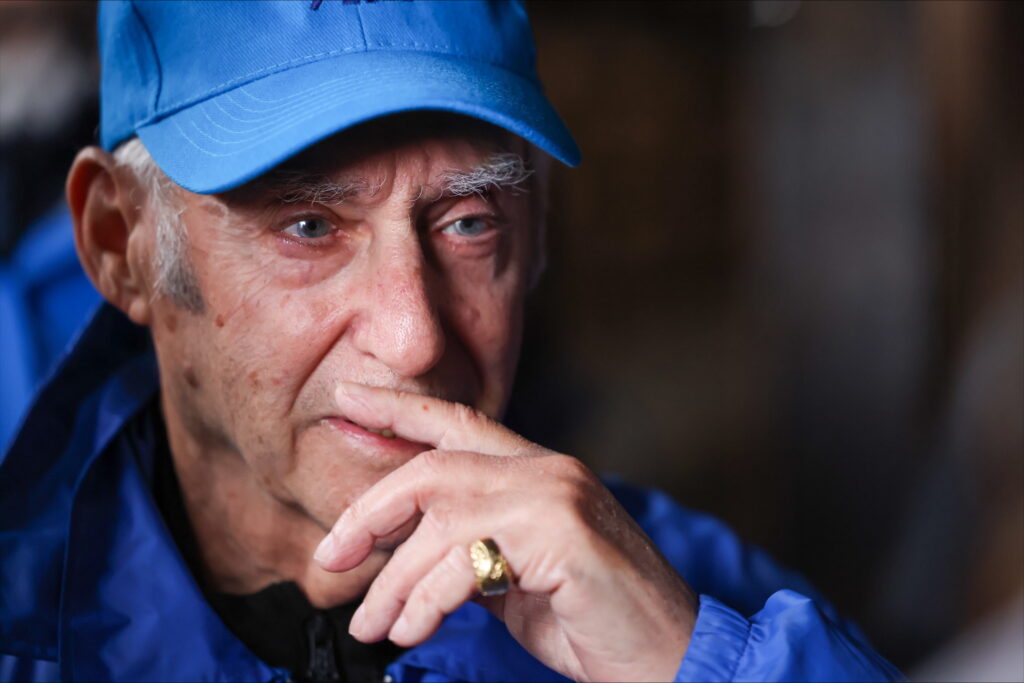
“While speaking to us in Warsaw, Alex told us the story of his Aunt Becky’s gâteau à l’orange (orange cake). While in Ravensbruck concentration camp, his aunt managed to write down this recipe. After his parents’ murder, his Aunt Becky went on to raise Alex after surviving. In addition to sharing his story, Alex tasked us with baking the cake with family and friends.
“Out of this, a group of alumni from our trip have created this project: ‘A Taste of Hope.’ On February 1st, university students from over 5 universities across Canada will come together to bake the gâteau à l’orange and hear Alex’s story. Proceeds from the event and this fundraising page will support the World Federation of Jewish Holocaust Survivors and Descendants. Alex was heavily involved with this organization, whose mission is to both create community for Holocaust survivors and their descendants and educate about the Holocaust to help fight against antisemitism and all forms of bigotry and hate.
“Here is information from our fundraising page for the event – ‘A Taste of Hope’: Fundraising for A Taste of Hope.
Ethan added that “it’s completely student led, all by alumni from our 2023 trip attending university at these various locations across Canada; Winnipeg, London, Kingston, Montreal.”
He also added: “Follow us on instagram@tastehope.“
Here is a link to a CBC story about Alex Buckman: Alex Buckman story
In a subsequent email Ethan gave the names of Winnipeggers who are involved in A Taste of Hope: Ethan Levene (studies at McGill), Zahra Slutchuk, Alex Stoller (studies at Queens), Coby Samphir, Izzy Silver (studies at Waterloo).
He also added names of others who are involved in the project: Jessie Ages, Anneke Goodwin, Lilah Silver, Ella Pertman, Ellie Vogel, and Talia Cherun.
To find out more about March of the Living in Winnipeg go to: March of the Living





